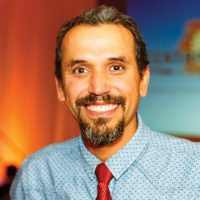
Baltazar De Anda Santana is the director of Orgullo Latinx LGBT+, a Madison organization with a mission to create spaces for Dane County’s Latinx LGBT+ community to thrive through education, social justice, and community engagement.
A long-time advocate for the Latinx community, De Anda Santana has worked with the Vera Court Neighborhood Center and the United Way of Dane County. Orgullo Latinx LGBT+ has made it a priority to increase the visibility of the LGBT+ Latinos through community service and connecting with allies. Orgullo Latinx LGBT+ held a vigil following the Pulse shooting in Orlando last year and organized dozens of Latinos to participate in local LGBT+ Pride parades. “We have put the LGBT+ Latino community on the map in Madison,” De Anda Santana said. “That is something that we didn’t have before. Right now, the community knows that we exist.”
As a gay Latinx man, De Anda Santana feels it is important to be proud of his identity to reduce stigma and stereotypes against LGBT+ people. “We are working hard to normalize LGBT+ (identity) in the Latinx community,” he said. “We want people to know that being gay means that you can be a volunteer, you can be a professional, you can be a leader.” Connect: orgullolatinx.org
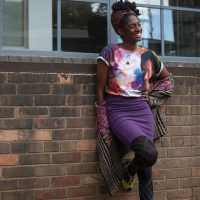
Tiffany Lee is the program coordinator at the LGBT Campus Center at the University of Wisconsin-Madison. Lee helps undergraduate students cultivate their leadership by training them to serve as discussion facilitators. “It is important to facilitate conversations,” Lee said. “There is not enough space for folks to come around and talk, and there seems to be a desire for it in the community.” Discussion groups center on topics that are important to queer students and encompass their intersectional identities.
Lee is pursuing her Masters degree in African-American Studies and Gender/Women’s Studies. She said learning about activists like the women in the Combahee River Collective spurred her to see her identity as a black, queer, women as a source of power. “It directly spoke to my life and the people I loved,” she said. “It spoke to how I moved through the world.”
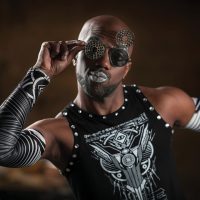
OD Kimani is a performer. He’s been a cabaret, stage, and film actor. For the past three years, Kimani’s primary focus has been burlesque. He remembers seeing his first burlesque performance in 2013 with his fellow performer, Mercury Stardust. He started out assisting Stardust with their shows, “but emceeing turned into guest spots, and that turned into full-on performances,” he said.
Kimani said most burlesque performers are self-taught, taking charge of their own costuming, makeup, and choreography. He loves the control of producing an entire show that is solely his creative vision. “I love to create my art, my own way, and execute it the way I want to.”
He also enjoys that the burlesque scene in Madison creates space for all types of performers. “I enjoy burlesque as an art. I appreciate it for body positivity and individual expression,” he said. “Every performer comes from a different walk of life. There is a variety of ages, genders, and races.” Connect: @od_kimani on Instagram
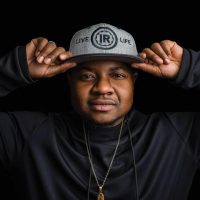
Ja’Mel Ware is the founder and chief executive officer of Intellectual Ratchet, a Madison-based lifestyle company. Ware was inspired to start IR to create spaces for diverse audiences to connect and feel comfortable in their communities. “I was tired of traveling to places like Milwaukee and Chicago for an urban experience,” Ware said. “I wanted to connect people of different backgrounds and allow people to bring their whole selves.”
Since IR’s inception in 2015, Ware has hosted events in the Madison and throughout the state. In particular, Ware is proud of his first event, a sold-out screening of the movie, “Straight Outta Compton,” partnering with the Wisconsin Union and U.W.-Madison student organizations to bring Golden Globe-nominated actress Issa Rae to Madison, and working with downtown Madison businesses to host the city’s first series of night markets.
As a trans person who was born with HIV, Ware said creating IR was cathartic for him because it allows people to focus on what he brings to the community, instead of his lived experience.
“My entire life, the story that the larger community knows about is being this kid with AIDS. When I transitioned, it happened again,” he said.
“I didn’t want to be fetishized by my identities. I wanted to have space where I can just be. It doesn’t matter that I am a Black trans man that lives with AIDS, it’s freeing to me. I am able to talk about my identities and not feel shackled by them.”
Ware’s ultimate vision for IR is to scale the model up, so there are places around the world where intellectual ratchets can build community. “We will draw audiences of tens of thousands and feature their local talent,” he said. “In 10 years IR will be a household name.” Connect: facebook.com/JaeMoFamo

Laura P. Minero is a Ph.D. student in counseling psychology at the University of Wisconsin-Madison. Minero immigrated to the United States with her parents at five. Minero said watching her parents work to provide her with a better life influenced her work as an activist. “That really shaped who I am as a person. I value my parent’s sacrifices,” Minero said. “Experiencing exclusion and marginalization compelled me to think about the other.” Minero’s identity as a queer, non-binary, undocumented person compels her to advocate on behalf of marginalized people, particularly undocumented queer and trans immigrants.
Minero wants to use her work as a scientist to influence policy to benefit under-served communities. “There is a lot of anti-immigrant and anti-LGBTQ policy that pretty much dictates our lives. People don’t really think about the day-to-day impact unless they are living it,” Minero said. “Policy impacts mental health. My hope is that, through research, we can enact change. I really see it is a way to promote well-being and policy that is inclusive.”
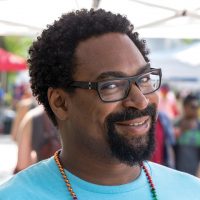
Monty Scott is an HIV/AIDS prevention specialist at the AIDS Resource Center of Wisconsin. Scott works in 13 counties across the state and provides testing, education, counseling, and other resources to community members. Scott makes it a point to meet people where they are, and often visits gay bars, community centers, and schools. He also leverages social media and dating sites to provide information about testing and preventative methods.
For Scott, it is important to talk openly about sexual health so people can safely enjoy themselves. “HIV and AIDS is still an issue around the world. With it affecting mostly gay and bisexual men, I feel in my heart that I need to provide this service,” he said. “A lot of people don’t talk about sex or the benefits and consequences that come with it. If I provide education on high-risk behavior, my community will take proper steps to protect themselves and enjoy sex.” Connect: [email protected]
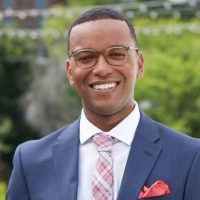
Cedric Johnson recalls returning to his hometown of Rockford after studying at Knox College: “I looked around and said, ‘there is nothing going on.’ I thought, ‘OK, I’ll step up and make something happen.” Johnson collaborated with friends to create spaces for young people to showcase their art, an opportunity they felt was lacking in their city. “Once I saw what could happen if people step up and do something, I thought, ‘ain’t no stopping me.’”
Johnson continues to live by that mantra as the Development and Communications Director at Briarpatch Youth Services. Briarpatch provides housing, job training, and programmatic support for runaway, at-risk, and homeless youth and their families in Dane County. Johnson estimates that over 40 percent of the youth Briarpatch serves are LGBTQ. Although his family was very supportive when Johnson came out as a teen, he is aware that experience is not the reality for all LGBTQ youth. “That is a big motivator for me every day,” he said.
Before coming to Briarpatch, Johnson worked in development at the Madison Children’s Museum. He has also served as the President of OPEN, the Out Professional Engagement Network. Johnson enjoys living in Madison because of all the opportunities the city provides for service. “The work that needs to be done keeps me here. It is a challenge,” Johnson said. “I know my skills, and if I am not able to do something, Madison is the type of town where you can coalition-build to do the work.”
Working in development, Johnson knows that networking is a powerful tool to initiate change. He makes a point to connect people with opportunities that would be a good fit for them and credits Madison as a great place to grow your personal and professional ties. “I’ve built such a great network of friends and mentors who have always been open to helping,” he said. “What drives me is seeing how one person can leverage their personality and their skills to make a tangible difference.” Connect: linkedin.com/in/cedricjohnson
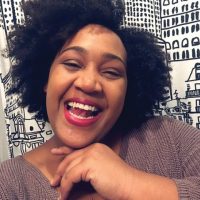
Bria Brown is the membership coordinator at Community Shares of Wisconsin. In her work, Brown helps non-profits boost fundraising and effectively utilize social media to promote their causes. In addition to her work at Community Shares, Brown is also a freelance videographer and online content producer.
Brown’s YouTube channel, “Unapologetically Bria Bea,” has amassed tens of thousands of views. She started producing videos as a hobby while she was at the College of William and Mary, and uses her talent to promote her brand and in her professional work. “I am really getting a chance to make a living out of it, which is cool,” Brown said. “But also flex a muscle and build my skills as much as I can.”
Although Brown only been in Madison for about a year, she’s already partnered with local entrepreneurs on a variety of projects, including producing a video for the Black Business Expo and the documentary “Throwing Rocks at the Pen.” Connect: @beaunapologetic (all platforms)
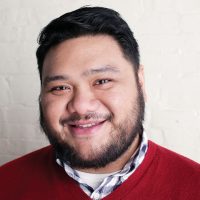
Gabe Javier is the director of the LGBT Campus Center and the interim director of the Multicultural Student Center at the University of Wisconsin-Madison. Javier said his work is “deeply rooted in intersectionality.” He strives to create spaces on campus where students can build coalitions and blossom in their identities.
“I like to concentrate my work on creating durable and sustainable communities. Places where people can find each other and find haven spaces and, thereby, be their true and authentic selves,” he said. “That takes a lot of trust, and trust is built on experience of doing really intentional work and gaining that trust.”
Javier started his career at the University of Michigan, where he earned his masters in higher education administration. At Michigan, he was a sexual violence educator with a focus on men. He credits that experience with helping him develop his social justice standpoint. “You can’t un-ring a bell or un-crack an egg. Once I started working with people who were doing amazing work around sexual violence prevention and getting men involved, I couldn’t not be involved in undoing misogyny and rape culture,” he said. “That translated into my own activism with my gay identity and community organizing. It is all related.”
In his six years at the U.W.-Madison, he is particularly proud helping to improve health care options for trans-identified students, the opening of the Black Cultural Center, and developing Crossroads, a partnership between the LGBT Campus Center and the Multicultural Student Center. “We are purposefully and institutionally putting resources out there for intersectionality,” Javier said. Connect: lgbt.wisc.edu & msc.wisc.edu
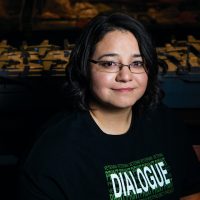
Initially, Yvette Pino planned to join the United States Army Reserves to supplement her income as a stagehand, but the September 11, 2011 terrorist attacks caused her to reevaluate her decision. “I had a ‘what if’ moment,” she said. “Could I live with myself for the rest of my life if I failed to follow through?”
After completing two tours of duty in Iraq, Pino eventually moved to Madison with her wife and enrolled as an undergraduate in the Art department at the University of Wisconsin-Madison. On top of being a veteran, at 27, she was older than most of her classmates. “I saw students appropriating military subject matter (in their art), but they had no connection to the Army, despite years of (United States) warfare,” she said. “The only way people were going to understand one another was to open up these conversations.”
Pino created the Veteran Print Project to facilitate conversations between artists and military veterans. She saw the project as a way to allow civilians to better understand the veteran experience, but also provide an outlet for veterans to find support in their communities.
“I wanted to help vets who were isolating themselves communicate and learn to tell their stories,” Pino said. “We can sometimes put things visually that we can’t put into words. I like to use art to tell stories, and every person has a story.”
Pino recently partnered with veterans from around the country to launch the Veteran Art Movement. The collective of veterans use art for healing and to challenge society to think about the effects of militarism. Connect: veteran-art-movement.net
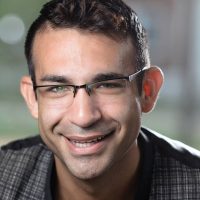
Todd Raymond Avellar is a Fresno, California native and earned his Ph.D. in counseling, clinical, and school psychology from the University of California-Santa Barbara. Avellar came to Madison last year as a post-doctoral resident at the University of Wisconsin.
Avellar emphasizes diversity and social justice in his work, using an approach called Multicultural Feminist Therapy to inform his practice. This focus prioritizes figuring out how to help clients based on their needs and values. “It challenges healthcare providers to think about their inherent power, privilege, and biases,” Avellar said. “This style of therapy is inherent to social justice work.”
As a first-generation college student, Avellar said he wants to serve as a model for his younger family members to pursue their passions. “I encourage them to follow their dreams and go where they need to go,” he said. Avellar enjoys mentoring students and will start a job as an assistant professor at a university in Pennsylvania this fall.
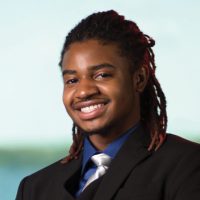
Elijah Holmes is a recent graduate of Madison East High School. Holmes began cultivating his standpoint as a leader when his sixth-grade teacher nominated him for the Pre-College Enrichment Opportunity Program for Learning Excellence (PEOPLE,) a program to help ambitious students of color enroll at University of Wisconsin-Madison. “I thought it was a good way to meet new people and prepare for college,” Holmes said.
Six years later, Holmes is excited to start his freshman year at U.W.-Madison on a full-tuition scholarship. “I plan to study psychology and education. I hope to get my medical degree.”
During his time at East, Holmes was the co-chair of the Gay Straight Alliance. In that role, he aimed to make his school more inclusive for LGBTQ students. The GSA successfully campaigned for gender-neutral bathrooms and altering the school’s health curriculum to better serve the needs of LGBTQ students. He also encouraged GSA participants to learn more about the contributions of LGBTQ people, using some of their meeting time to study history. “I found pride in who I was,” Holmes said. “I saw other people who were Black and gay, like me, doing great things.”
While in high school, Holmes was involved with GSAFE, a statewide non-profit for LGBTQ students. He participated in GSAFE’s Foundations of Leadership class, and was one of four seniors to receive a college scholarship from the organization. Connect: linkedin.com/in/elijah-holmes-3b4243141
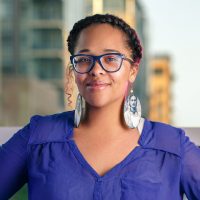
Ali Muldrow is the director of youth programming at GSAFE, a statewide organization with a mission to create inclusive school communities where LGBTQ+ youth can thrive. At GSAFE, Muldrow created and facilitated the New Narrative Project, a program focused on amplifying the voices of incarcerated youth.
Muldrow’s commitment to young people compelled her to run for the Madison School Board in 2017. As a product of Madison’s public schools, Muldrow sought to take down barriers to success for students of color and LGBTQ+ students. Muldrow won a three-candidate primary election with over 40 percent of the vote. Although Muldrow did not win the general election, her campaign sparked conversation in the Madison community around creating nurturing environments for all of Madison’s students.
Muldrow is a founding member of Black Girls are Magic. The group is committed to making sure Black women and children in Madison have places where they feel welcomed through organizing family-friendly gatherings across the city. Last year, the group walked in the Juneteenth parade, organized a trip to the Dane County Farmers’ Market on Madison’s Capitol Square, and a series of brunches. Muldrow was the inaugural recipient of the Carola Gaines Collaborator of Year award at Wisconsin’s Black Women’s Leadership Conference in 2016. Connect: [email protected]
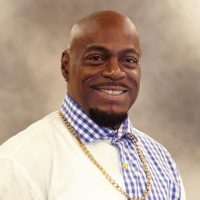
Ronnie Grace is a Milwaukee-based HIV/AIDS prevention activist and advocate. After contracting the virus over 30 years ago, Grace was compelled to act because he wanted to put a face to people living with HIV. “It is not a death sentence. We can have healthy, full lives,” Grace said.
It is particularly important for Grace to foster support networks for people in Milwaukee affected by HIV/AIDS. Through his work with Diverse & Resilient, a non-profit focused on LGBTQ+ issues, Grace facilitates Sisters Helping Each Other Battle AIDS (SHEBA), a bi-weekly support group for African-American transwomen.
Grace said 70 percent of people living with HIV will be over 50 by 2020. He wants to draw attention to the needs of older adults living with HIV/AIDS and do more to support and engage them as they age. “I was 28 when I found out. I never thought I would reach 30, and now I’m 59,” Grace said. “I think [getting older] is going to be a new and exciting chapter of my life. I am looking forward to another 30 years of living and thriving.” Connect: [email protected]
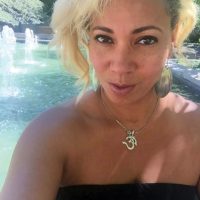
Dana Pellebon is the director of Housing at Porchlight Inc., the largest provider of low-cost housing for homeless men, women, and children in Dane County. She’s been dedicated to community service her entire life, and has a particular interest in issues that impact women. Pellebon was on the Board of Directors for Domestic Abuse Intervention Services and partnered with the YWCA and the Salvation Army to develop Second Chance, a program that helps low-income families transition from homelessness into stable housing.
In addition to her community work, Pellebon is passionate about the arts. She’s produced more than 60 plays since 2000. She is also a director, actor, and former “caburlesque” performer. “My drive is to make sure that stories (of marginalized people) are told and represented,” she said. “It’s huge, in Madison, to be able to have representation.”
Pellebon is also a mother to a 12-year-old son with autism; he has followed his mother and cultivated a passion for theater and social justice. “I am a pretty busy lady. My son comes with me to a lot of things,” she said. “He should be involved in social justice issues, know how to be in meetings, and protest.”
As a bisexual woman, Pellebon is committed to not letting the opinion of others steal her joy. “My whole stance for all of it has been living openly and honestly and going from there. If people have issues with it, they have issues with it. That’s yours, not mine,” she said. “It’s my journey, my body, my liberation.” Connect: @ragingjourney on Twitter
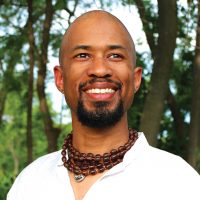
As a classically trained opera singer, one of the most devastating moments in Keith Borden’s life was losing his long-time voice teacher to a heart attack in 1999. “I physically couldn’t sing,” he said. “I was able to find my voice again through moving my body.”
Borden was already a yogi but became more disciplined in his practice as a form of healing. A few years later, in 2002, he completed his first yoga teacher training, and marketed his yoga offerings under the name reUnion yoga. “Yoga means union. It helped me find a needed reunion with myself,” he said. “Yoga is a way to get back to who you are and who you are meant to be, to do the work you need to do.”
Borden approaches his yoga practice from a spiritual perspective by “providing space for people to get close to their best and better selves.” He teaches classes in Madison and all over the world. Borden has led workshops in the San Francisco Bay area, New York City, Germany, Canada, Spain, and Portugal.
One of his most meaningful teaching experiences was with the Madison East High School basketball team after the officer-involved shooting death of student-athlete Tony Robinson. “I took it as an opportunity to not only share yoga with them, but to share an example of other ways that Black men can present themselves,” Borden said. “Representation is key—if you don’t see people that look like you, you don’t see yourself reflected.”
Borden and his husband are also marriage equality activists. They were plaintiffs in a lawsuit against the state of Wisconsin that made it to the United States Supreme Court. In his free time, Borden enjoys reading, biking, traveling, and spending time with his young daughter. Connect: reunionyoga.com
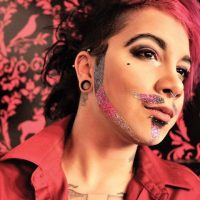
Ariel Lebron is a Madison-based burlesque and drag performer. As a gender-fluid person, Lebron doesn’t allow genres to confine or define their work. “There are overlaps in burlesque and drag. So many burlesque performers identify as LGBTQ,” Lebron said. “Performers would benefit from collaboration to showcase everyone’s ability.”
Lebron’s burlesque stage name, Melani Khandroma, represents their personality as a fluid sprite, a practical joker who is neither here nor there. Their drag persona, Anthony Savage, commands the stage as one of Madison’s only drag kings. Savage recently earned a top-ten spot in the online drag competition, King Me.
As a Puerto Rican person, Lebron wants to increase visibility among Latinx performers in burlesque and drag. “My only goal is to inspire other Latinx performers who are interested or not sure if they can do it because of cultural boundaries, to show them it’s possible,” they said. Connect: facebook.com/MelaniKMadison
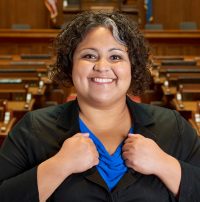
Politics has always been a passion for JoCasta Zamarripa. As a volunteer for John Kerry’s presidential campaign in Milwaukee, Zamarripa discovered that her district had the lowest voter turnout in the Wisconsin. It is also home to the largest Latino population in the state.
Zamarripa decided to run for the 8th district assembly seat to increase civic engagement in her community. “That was the catalyst. I knew this would end up being my life’s work,” Zamarripa said. “I knew it would help to push back against anti-Latino and anti-immigrant sentiment, and also grow our influence and power so we would be a productive, successful constituency.” In 2010, she became the first Latina ever elected to the Wisconsin State Legislature.
When Zamarripa ran for her second term, she decided to come out as bisexual. Although she was afraid she would lose some support, it was more important for her to bring her entire self to her work as a legislator. “It was really painful spending my whole first term in the closet,” she said. “I wanted to be a leader so during my first re-election I decided to run out and open.”
Despite an uphill battle as a Democratic representative in a Republican-controlled state legislature, Zamarripa remains steadfast in advocating for policies that impact people of color and LGBTQ+ people. She wants to make sure undocumented people can access driver’s licenses and alter antiquated language in state statutes to reflect the rights of same-sex couples.
Zamarripa said she loves interacting with her constituents and is humbled to serve the people of Wisconsin. “The (Wisconsin) Assembly is ‘the people’s house.’ I’m honored to represent the people on Milwaukee’s near south side.” Connect: facebook.com/Rep.Zamarripa
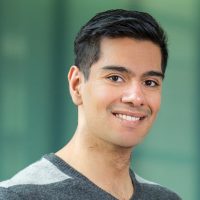
Akshat Sharma is a Ph.D. candidate in Medical Microbiology & Immunology at the University of Wisconsin-Madison. Sharma’s work focuses on reconstituting human immune systems in mice to study human diseases, like HIV or cancer. Sharma said he hopes his research will one day lead to lifesaving procedures for humans, like eliminating tumors and combating viruses like HIV.
“[Science is] so close to figuring out how to eradicate HIV,” Sharma said. “That has been a driving force for why I am interested in [this research.]” Sharma has enjoyed his six years in Madison and enjoys the opportunities for personal and professional growth. “Madison is a lively town. Good food, cute boys, and great research.” Connect: linkedin.com/in/akshatsharma28
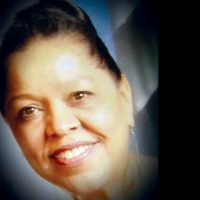
Rita Adair is a retired social worker. For 30 years, she worked for the Dane County Department of Human Services and the District Attorney’s office. Although she saw value in her work, she felt there was more that could be done to make a difference. “When you work in a system, you are a Band-aid and often don’t feel like you are solving the issues,” she said.
Growing up, Adair’s parents fostered children. She appreciated the life her parents were able to give her and her siblings, and wanted to provide the same comfort and security to others. As a foster parent, Adair cared for more than 23 girls. “With foster care, I knew I was making a difference and changing lives by providing a nurturing and safe home,” she said. “A chance to dream.”
When Adair came out at 45, she created the online group, “Lez In Color,” for lesbians of color around the country to share information, events, and support one another. “Outside of campus, I never saw large numbers of women of color [in Madison]” she said. “Where are the women that look like me? What can we do to come together?”
After she retired, Adair moved to Chicago for six years and started Adair Entertainment. Her parties attracted women from across the city, offering space for hundreds of women to connect. She recently returned to Madison, and is working to “find her niche back home.” Currently, she is working on her first book and hopes to continue to create spaces for women of color in Madison. Connect: facebook.com/groups/LezInColor
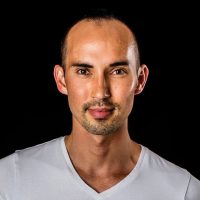
Joshua Moon Johnson is an author, activist and assistant dean at the University of Wisconsin-Madison. Johnson grew up in Mississippi and was raised by Pentecostal ministers. Johnson said he had a happy childhood, but recalls feeling othered and, at times, unsafe in his community. After completing a bachelor’s and master’s degree at the University of South Alabama and then the University of Alabama, he sought more inclusive spaces to live and pursue his career in higher education. “The more I moved around and got exposed to different social circles and spaces, the more I learned about how my upbringing and family really shaped and impacted me and how I saw myself.”
Johnson earned his doctorate in education and LGBT studies from Northern Illinois University. His work centers on the experiences of queer people of color and how they navigate religious identity during college. “Creating inclusive spaces in higher education has been the focus of my career for over a decade,” he said.
Johnson served as the director of the LGBT Center and the Women’s Center at the University of California-Santa Barbara and supported students of color and queer students in his role with the Semester at Sea, an international study abroad program. “(Semester at Sea) challenged me to look at social justice, oppression, and privilege, from a broader and global lens,” Johnson said.
At U.W.-Madison, Johnson helps students cultivate their voices as campus activists. He is particularly proud of supporting students who lobbied the university to open the Black Cultural Center and create Our Wisconsin, an initiative to improve the culture and climate at U.W.-Madison for all students. Connect: joshuamoonjohnson.com
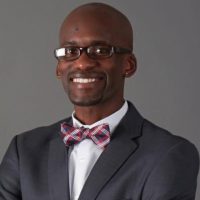
Dereck Barr-Pulliam is an assistant professor of accounting at the School of Business at the University of Wisconsin-Madison. As an undergraduate, Barr-Pulliam explored a host of majors and decided to enroll in an accounting class. “I really liked and identified with it. It really made sense for me,” he said. “I was encouraged by my professor who said ‘you can pretty much do anything in business with an accounting degree.’”
After earning his MBA from the University of Mississippi, Barr-Pulliam worked as an accountant for six years before pursuing his Ph. D. He wanted to teach to show underrepresented students that they have a place in the business world.
“For our students, it’s good for them to see people that they can aspire to. The more that they see someone they can identify with, it makes for a better experience for them, especially in the business school,” he said. “We are seen as a very exclusive club over here, and majority white. Anyone that can break down those stereotypes, it is helpful not only for the school but the students, too.”
Barr-Pulliam seeks to build relationships with students both inside and outside of the business school. “I am very busy, but I am also very visible,” he said. “I try to cultivate relationships across the entire student body. It is incumbent upon the facility to make the school a more welcome environment.”
After he completed his Ph.D. and was looking for a place to teach, it was important for Barr-Pulliam to live and work in a place where his family could feel comfortable and thrive. “I thought, ‘Can I be who I am there? Can people know that I have a husband and I not face any backlash?’” he said. “Can my child grow up in this place and not face ridicule? Her having two dads, would that be taboo?” Connect: bus.wisc.edu/faculty/dereck-barr
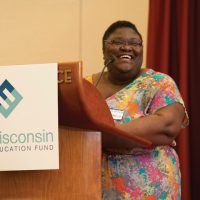
As a student at Bowling Green State University in Ohio, Sheltreese McCoy remembers how hesitant she was to come out. She attended LGBTQ student club meetings on campus, but did not see any other students who reflected her identity. After moving to New York and finding love and community, she made it her mission to recreate those spaces from queer students of color on their campuses.
McCoy is a Ph.D. candidate in educational leadership and policy analysis at the University of Wisconsin-Madison. Her research focuses on LGBTQ people and higher education. She puts her scholarship to work through the Crossroads Initiative, the country’s first university-sponsored program for queer and trans students of color. McCoy founded Crossroads to help queer and trans students access critical services and build community on campus.
“We need to work with students at the intersections,” McCoy said.
Some of the cornerstones of the Crossroads Initiative include Rooted, a bi-monthly discussion group for LGBTQ students of color, and QTPoC, an annual resource guide including books, organizations, websites, and articles that center on queer people of color.
“All aspects of the guide focuses on queer and trans people of color,” McCoy said. “We were very intentional with how we named the guide so people could feel comfortable (accessing it).”
McCoy is a primary organizer for two national conferences, Creating Change and the Wisconsin Trans and Queer People of Color Summit, which bring students from around the country together to advance the interests of LGBTQ people. Connect: students.wisc.edu/msc/wp-content/uploads/sites/7/2016/10/QPOC-Crossroads-Resource-Guide.pdf
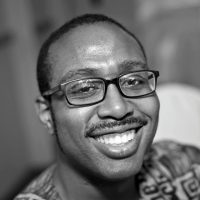
Victor Crentsil is a technical services representative at Epic Systems. He is responsible for ensuring several hospitals using Epic’s software can do so to the best of their ability to improve patient care. Crentsil is also a team-lead and involved in a variety of company-wide initiatives.
Crentsil has built relationships in Madison’s LGBTQ+ community through participating in affinity groups, the Madison Minotaurs rugby team, and the First Baptist Church’s Chancel Choir. Crentsil said that “visibility is crucial in ensuring that LGBT people, specifically those of color, don’t feel isolated in Madison.” Connect: [email protected]
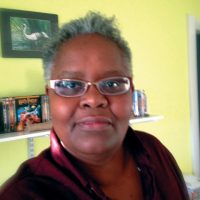
Alnisa Allgood describes her work as the “intersection of nonprofits, technology, and community capacity building.” She is the founder and executive director of Nonprofit Tech, a company that helps nonprofits use technology to work more efficiently. “We help organizations understand their technology needs and where they want to be in the future with their mission and service in mind,” she said. “We want technology to be an amplifier for their message.” Nonprofit Tech has worked with organizations all over the country, including Olbrich Botanical Gardens and Consumer Action.
Allgood is also the founder and executive director of Collaboration for Good, Inc. a Madison-based company focused on building the capacity of for-profit or not-for-profit community service organizations. Allgood is passionate about this work because she thinks it is important to invest in communities so they can thrive. “I am a really strong believer in social and civic responsibility and the capacity that communities have to be supportive of their populations,” she said. “I don’t believe you can have a vibrant city or a growing neighborhood if you totally ignore the things that make that space useful and engaging for the individuals that exist in it. A lot of that comes from the social good sector.”
Collaboration for Good plans the annual Madison Nonprofit Day Conference, the Social Good Summit, and partners with Forward Fest, Madison’s premier tech and entrepreneurship festival.
Allgood’s interest in technology started in college. At Penn State, she discovered her first computer. “There was kind of no stopping me after that,” she said. As a tech generalist, she is passionate about learning any and all things related to computers and technology that can help the sector. Allgood was the founder and inaugural director of the LGBT Campus Center at the University of Wisconsin-Madison. Connect: @nonprofit_tech on Twitter & collab4good.org
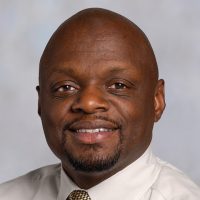
As the Executive Vice President & Chief Human Resources Officer at CUNA Mutual Group, the leading provider of insurance and financial services to credit unions and their members worldwide, Cedric Ellis sees the importance of a company’s values reflecting its culture. He wanted to help create a place where people could bring their whole selves to work.
“This is the first time I’ve worked for a company whose purpose I believe in and can rally behind. It’s a unique situation to be in, that’s why I’ve stayed here for 12 years,” Ellis said. “We’ve wrapped our arms around diversity and inclusion as a strategy to create a culture that embraces and leverages diversity, not just as an employer, but in the marketplace. I’ve worked for other companies where I had to hide that I am a part of the LGBT community. Not here. CUNA Mutual Group embraces me for who I am, and we work to embrace all differences, regardless of the dimension of diversity.”
CUNA Mutual Group’s mission to help all people, regardless of their financial status, invest in their futures resonated with Ellis. As one of 11 children, and the only one of his siblings to graduate from college, he is uniquely aware of how poverty can be a barrier to fulfilling your purpose. “I said ‘yes’ to CUNA because the company’s mission aligned with my own personal mission and my struggle, growing up poor,” he said. “I see CUNA Mutual Group as a place where you can prosper.”
To help CUNA Mutual Group’s employees prosper, Ellis spearheaded the implementation of a company-wide diversity and inclusion program. A part of the program included the creation of employee resource groups, safe spaces for co-workers to connect around their identities. Under his watch, the company also established on-site medical clinics where employees and their families can receive health care.
Ellis makes it a point to share his story with young people. He serves on the Board of Directors for Big Brothers, Big Sisters of Dane County. Ellis said mentorship was an integral part of his success. “Mentorship was a big thing for me as a kid, that is how I pay it forward,” he said. “How can I give kids of color an opportunity to see the world bigger than where they live? That was critical for me, and my mentors helped me navigate my way.”
Ellis said expanding his perspective has opened him up to the rest of the world. Travel is one of his passions. He has visited every continent and approached each experience with respect and humility. “I’ve had the fortune to see a lot of different cultures. I walk into a new place eyes-wide-open, seeking to learn as much as I can.” Connect: [email protected]
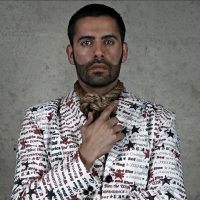
Rolando Cruz is a multimedia artist. He moved to Madison shortly after he graduated from high school. As an undocumented immigrant and openly gay Latino, he faced immense challenges coming to terms with his sexuality and integrating into a new culture. Eventually, he enrolled in a photography class at Madison College. He used photography to find his voice, in a society that often silences marginalized people.
“As an immigrant, you often find yourself in the shadows and behind the scenes,” he said. “I want to confront this perception and illuminate the value of not only our Latino community, but additionally our gay community.”
As an artist, Cruz uses his work to challenge people to question their assumptions about identity. In a recent photo exhibit, Cruz used a series of self portraits representing different cultures and ethnicities.
“A lot of people didn’t realize that it was the same person in the self portraits. The whole idea was for them to become aware of their unconscious bias,” Cruz said. “I wanted them to ask themselves, ‘what do I feel about this person versus this other person if the only thing that changes is the color of the skin and the outfits they are wearing?”
Cruz’s work interrogates themes like identity, displacement, and social perceptions. His work has appeared in several locations throughout Madison and Chicago, and is featured in several magazines and recently exhibited at the Overture Center, Justified Art and CelebrARTE, 2016. Connect: Rolandocruz.com
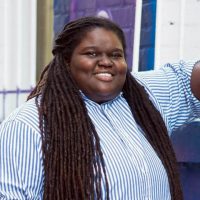
M Adams is the co-executive director of Freedom Inc., an organization dedicated to ending violence within and against communities that identify as low-income, gender-nonconforming, women, people of color, youth, and elders.
Adams came to Madison from Milwaukee in 2002 as an undergraduate at the University of Wisconsin-Madison. Seeing how students of color and queer students were treated on campus helped Adams to cultivate their activist standpoint. “I was able to have a bird’s-eye view of how the system impacts people of color,” they said.
In addition to their work with Freedom Inc., Adams is a member of The Movement for Black Lives, a national collective of organizers that developed a platform for liberation for Black people following the shooting death of Michael Brown by a police officer in Ferguson, MO. Freedom Inc. also partnered with other local activist organizations that called for justice after the officer-involved shooting death of Tony Robinson in Madison.
Although Adams thinks Madison has a long way to go before it can be a place that is truly welcoming to all people, their vision is clear. “When I think of what Madison can be, it should be a place where queer folks of color can thrive. Where our economic, social, and political needs are all fully met, and we can perform and live well under it,” Adams said. “At the root of it, it is about being able to live our fullest lives.” Connect: freedom-inc.org
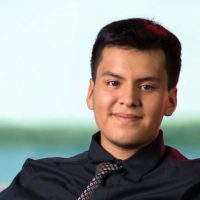
Alan Morales is a recent graduate of Madison West High School. Morales was always passionate about political advocacy for queer people of color, but said the death of a close friend compelled them to increase their impact as an activist. “I wanted to be more involved,” they said.
Morales’ is a leader in the Madison West High School Gay-Straight Alliance. The GSA was instrumental in establishing gender-neutral restrooms and a gender-neutral homecoming court. Morales is also the student body vice president at West High, the first QPOC elected to the position in the school’s history. For his efforts, Morales was one of four seniors to receive a college scholarship from GSAFE, a Wisconsin-based nonprofit dedicated to creating more inclusive environments for LGBTQ students.
Outside of school, Morales also sits on the Dane County Public Protection and Judiciary Committee. They volunteer with several local and national organizations, including the Human Rights Campaign, and the Democratic Party of Wisconsin. Morales’ dream is to run for United States Senate. They will attend college in Santa Barbara, California this fall. Connect: @alan_manuel17 on Instagram
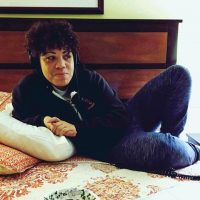
Amber Sowards is a Madison-based photographer. Sowards sees photography as a way to show the complexity of the human spirit. “My photography is made to show empathy, raw emotion, and intimacy,” they said. “The beauty, in the pain, in the wanting, is what I want to find and capture. I think that LGBTQ community has a direct relationship to that.”
Sowards does not like to place a lot of importance on labels, and sees themselves as a creative spirit on a journey to find their place in the universe. “I know (labels) are important to the world because that is the first thing they see,” they said. “For me, I am just a being, a soul still looking for a place to settle in and find a little bit of peace and self-reflection.” Connect: ambersowards.com
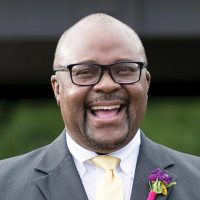
Bernie Hoes is lucky enough to do what he loves every day. As an English Instructor at Madison College, Bernie said education is “in his blood,” and he knew as a child he wanted to be a teacher.
Bernie’s path to the classroom was not a direct one. He dropped out of undergrad, partied, and waited tables before returning to school at 28 to finish his degrees. It’s an experience, Bernie said, that helps him to connect with his students, many of whom are students with various life experiences, and at varying stages of their academic, personal, and professional lives.
“Here at Madison College, I am blessed to work with young adults, returning adults, veterans. You name it, I have it in my classroom,” he said. “I like it because people are at the point where they are making life decisions. For instance, I tell my younger students ‘the decisions you make now will impact the rest of your life.’”
In his 20 years living in Madison, Bernie has immersed himself in the community. He currently serves as a Community Representative for Community Shares of Wisconsin, and on the Overture Center Community Advisory Board. In the past, he served on the board of directors for the Out Professional Engagement Network and as Board Co-Chair for GSAFE.
Bernie enjoys living in Madison, but said he is aware of the challenges Black, gay men face in making authentic connections in the city. “I am acutely aware of the statistics and experiences highlighted in 2013’s Race to Equity Report for African Americans in Madison & Dane County,” he said. “I live and witness these experiences in my day-to-day interactions here in Madison.” Bernie makes it a point to build social ties in his existing networks and make himself a resource for others.
“As a single, Black gay man, it is not a walk in the park, but I am fortunate enough that I’ve created a supportive and strong circle of friends,” he said. “I like to talk to people and be supportive of younger LGBTQ people, especially those of color. I make it a point to reach out to them to say ‘Hi, I see you. And genuinely want to know who you are.’”
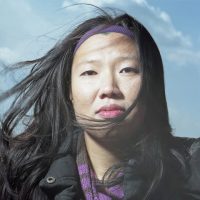
Laura Klunder is a social worker and community organizer. She came to the United States in 1985 and identifies as a bi-national adoptee from Korea. After living in Wisconsin and attending the University of Wisconsin-Madison, Klunder returned to South Korea to do political organizing work with adult adoptees and reconnect with her first mother and siblings. During her time there, she also worked with Adoptee Solidarity Korea, a group that advocates for the rights of single women to raise their children. Klunder also partnered with a Korean NGO to expand the definition of family to include LGBTQ+ single parents and families. In 2015, Klunder’s story was featured in the New York Times Magazine.
Currently, Klunder works as the program director for Inclusion Education at the U.W.-Madison and oversees the Division of Student Life’s “Our Wisconsin” program. The initiative was created in 2016 to make the university more inclusive for all students, including cultural competency training for all undergraduate first-year students. Klunder sees U.W.-Madison as “a place of belonging and a place to resist.” She will start her Ph.D. in social welfare this fall. Connect: [email protected]
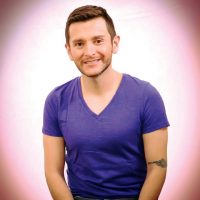
Diego Campoverde is the Senior Marketing Communications Coordinator (Bilingual) at Quartz Health Solutions. Originally from Ecuador, Campoverde moved to Madison in 2002 after completing his degree in communications from the University of Azuay. Campoverde worked for Mid-West Family Broadcasting for over a decade. On his radio show, he prioritized the needs of the Latino community, using his time slot to share information about programs and resources that could benefit his listeners. “It is in my nature to be a communicator. That is how I get involved with many organizations across Madison,” he said.
Campoverde’s interest in the community led him to co-found two organizations, Alianza Latina and Orgullo Latinx LGBT+. Both groups prioritize supporting the LGBTQ+ community in Dane County. As a communications expert, Campoverde is particularly proud of Orgullo Latinx’s ability to use social media to reach beyond Madison’s borders to create a global community of LGBT+ people and allies.
“We are able to provide critical info about the LGBT+ community in Madison and all over the world. It is important to be able to communicate with our allies and talk about who we are,” he said. “The Latino community still has a lot of misconceptions about LGBT folks. We are creating a bridge across (multiple communities) to help them better understand what it means to be LGBT+.”
Campoverde is involved in Quartz’s diversity and inclusion committee and thinks it is important to be open with his co-workers about the unique needs of the LGBT+ community. “It has been quite a journey for me to be openly gay. My involvement with many organizations in Madison that focus on LGBT+ Latinx communities has really helped me to become the person I am now,” he said.
“I know there are risks involved—there are still—but I feel more free and safe. When I talk in meetings, I talk about my partner and my community. I am very comfortable being who I am in the workplace.” Connect: facebook.com/orgullolatinxlgbt
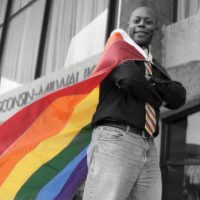
Gary Cooper-Sperber is a senior academic advisor at the University of Wisconsin-Milwaukee. He has been a part of the UWM community for over a decade, completing his undergraduate and graduate education there. Cooper-Sperber was a member of UWM’s first class of lavender graduates and received a student award from the LGBT Resource Center for his community service work.
Cooper-Sperber decided to pursue higher education to increase the visibility of LGBTQ+ people of color at universities and to give students a reflection of themselves. “I think it is important to have as much representation of queer people of color as possible in higher education to encourage others in our community to take advantage of it,” he said.
As a student advisor, Cooper-Sperber enjoys building relationships with LGBTQ+ students and students of color on campus. He sees education as a powerful tool for marginalized people to use to uplift themselves and serve their communities.
“As a Black, queer, cis male, I think it is important for me to give back to my community as much as possible,” he said. “I can connect education to my community by helping students come through (UWM) and work on the inside to ensure institutional policy is more fair and not systemically oppressive towards certain groups.” Connect: facebook.com/coopergaryc & @GaryCCooper on Twitter
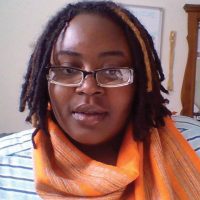
Alix Shabazz is the CEO of Debra’s Love Cooperative, a collective of queer entrepreneurs of color with a mission to build capital to support small businesses. Debra’s Love is named for two mother figures in Shabazz’s life who nurtured their LGBTQ+ children and provided support and solace for other youth.
“There is this myth that Black people are more homophobic than anyone else and that Black parents don’t support queer kids,” Shabazz said. “These are two mothers with queer and trans children, and they have been mothers for all of us.”
Shabazz’s entrepreneurial endeavors include Butiq, an online concept to thrifting and CocoaBean, a handmade beauty company. Shabazz also works at Madison’s Tenant Resource Center. In her role, she provides services for Black, queer folks who are currently homeless or at risk of homelessness.
Shabazz served as an organizer at Freedom Inc., but decided to step away to focus on starting her own business and prioritizing self-care. She still considers herself an activist, but is serving the community in a different capacity. “I like not being in the public eye. It’s a tough place to be to have every part of you scrutinized,” Shabazz said. “A big part of organizing is direct services, and the transition to fully doing direct service has been beneficial to my mental health.” Shabazz also helps train other activists as co-coordinator of the Neighborhood Organizer’s Institute at Lussier Community Education Center. Connect: facebook.com/butiqthrift
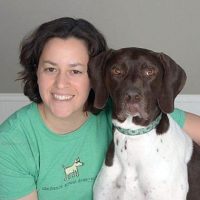
Tiffany Virag is an orthopedic board-certified physical therapist. She moved to Madison 12 years ago to pursue advanced training in manual physical therapy. Three years ago, she opened her own practice, Madison Physical Therapy and Consulting. Virag started her business to better serve patients who are under-insured or who’ve experienced automobile and workplace accidents.
“I saw these gaps in health care that no one was really addressing,” Virag said. “It could take four to six weeks for people to get appointments. Physical therapy doesn’t work if you can’t get in for treatment. A lot of clinics don’t target (automobile and workplace injury) populations. Additionally, some people could not afford their co-pays or deductibles.” Virag also assists patients with return to work testing to help them find new career options after they’ve suffered a life-changing injury and may not be able to return to their current or former line of work.
Virag is an animal lover and has a side business, Pawsitive Results PT, which focuses on physical therapy for rescue dogs. She felt compelled to act after police raided a puppy mill in Ohio, and she saw the condition of some of the animals.
“One of the dogs was so weak he couldn’t lift his head up against gravity. I spent a couple of weeks with the dog, helping him get stronger and have a normal life,” she said. “There is a need for this, and rescue groups don’t necessarily have the money to pay for it. I wanted to make it a part of my business.”
During her free time, Virag enjoys biking. She is a member of the Bombay Bicycle Club and said Madison is a great place for cyclists. “The cycling community caused me to stay; a lot of them have become family over the years,” she said. “If you get just outside of Madison on a bike, it is so beautiful.” Connect: madisonptandconsulting.com & pawsitiveresultspt.com
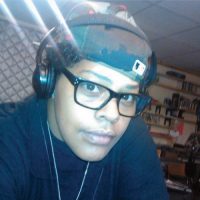
Cooper Talbot is at her best when she is in the studio. “Music is a big part of my life; there is always that one song that lifts you,” she said. As a host of “Her Infinite Variety” on WORT, Madison’s community radio station, Talbot likes to use her weekly show to bring joy to her listeners. “People have a wonderful time with me sharing my voice and music.”
Talbot moved to Madison in 2011 from New Jersey to join the Madison Cougars (now the Madison Blaze), a professional women’s football team. After suffering an injury, she was forced to retire prematurely from the game.
Leaving football caused Talbot to evaluate what truly made her happy, and she found her niche in Madison’s creative scene. In addition to DJing, Talbot is also passionate about theater. She serves as an executive board member at StageQ, a theater company dedicated to telling the stories of LGBTQ people.
“Working with StageQ really puts me in touch with the LGBT community,” she said. Talbot has both written and produced plays during her time at StageQ. “There is a sense of togetherness when you are working on a show,” she said. “A good show only succeeds with the whole cast.” Connect: @herinfinitevariety on Facebook
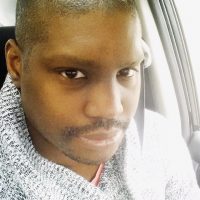
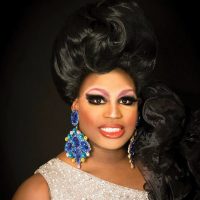
Duane Herron is the Midwest Regional Coordinator for Great Lakes Hemophilia Foundation. In his role, Herron manages federal grants to monitor 14 hemophilia treatment centers that care for over 5,000 patients.
With almost 20 years of experience in public health, Herron was motivated to enter the field after losing both his biological and adopted mothers to heart disease when they were in their 40s.
“I wish they were still here,” he said. “If they had taken better care of themselves, or if the health system was a little more kind to them, despite their lack of resources, they’d probably still be here.”
Herron balances his work with his passion for drag performance. Since 1998, Herron has performed across the country as Symphony Alexander Love. For Herron, drag was a way to continue to explore performance and hold on to childhood values. “I was a professional baton twirler as a kid, and also musically inclined,” Herron said. “Drag allowed me to perform and be modest. I could cover my body and learn how to entertain at the same time.”
Symphony is Herron’s drag name. She has been a finalist at several national drag pageants. Symphony currently holds the title of Miss Wisconsin USofA at Large. Symphony said younger drag performers seek her out as a mentor since she is not only a successful performer but also career oriented. “I wanted to be the drag queen who was also a professional during the day. It allows people to look up to me and respect me for my contributions on and off stage,” she said.
Even though she is a veteran performer, Symphony only has three drag children. To be attached to her legacy, it is key that you possess what it takes to be a successful drag performer. “I am a strict mother; to be a true child, you have to possess talent, and you have to be smart,” she said. “Drag is a business, if you don’t have any business smarts, you are not going to survive. If you don’t have any talent, you are not going to get booked.” Connect: [email protected]
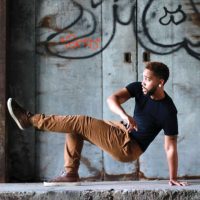
Syd Robinson is the LGBTQ advocate at the Milwaukee LGBT Community Center. Robinson started his career at the Center as a member of Public Allies, an Americorps service organization. He credits Public Allies for cultivating his interest in activism. “That is how my mind got turned on to being of service to my community. That was the best decision I’ve made so far,” he said.
Robinson worked with the ACLU of Wisconsin as the state’s youth organizer. Although he enjoyed his work with the organization, he wanted to be more directly involved with the LGBTQ+ community and decided to return to the Center. “I am a trans person who has been very blessed in the things that I’ve been able to do and the people that I’ve been able to work with. I wanted to give back to my own community, especially LGBTQ youth of color,” he said. For his work, Robinson received the Gary Hollander Adult Leadership Award from Milwaukee non-profit, Diverse & Resilient.
In addition to his advocacy work, Robinson is an actor and DJ. He recently got involved with a DJ collective in Milwaukee, with a mission to create safe social spaces for marginalized communities. Connect: gofundme.com/sydrobbie
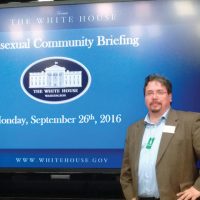
Victor Raymond is a sociology professor at Madison College. As a member of the Lakota Sioux tribe, Raymond is two-spirit, which encompasses his identity as a bi-sexual, bi-racial man. He believes that LGBTQ+ people need broader, culturally responsive definitions of identity. “If you look at communities of color and Native culture, you will see that there are different understandings of gender and sexuality that do not fall neatly into the labels that we use,” he said. “We ought to be ready to recognize a rainbow of understanding.”
Raymond has been a political activist since college and works to advance causes affecting bisexual people. He served on the board of directors for BiNet USA, a nonprofit that seeks to connect the bisexual community. He was invited to the White House to speak about the needs of bisexual people. He was also a member of the Indigenous People’s Task Force. Raymond believes that politics is at the root of education and social change. “You can’t be an educator without addressing issues of political importance. I don’t think you can build community without looking at politics as an arena for change,” he said. “If you are going to make the world a better place, politics is where that work needs to be done.”
Ashli Lyles is a rising senior at Madison East High School. Lyles serves on GSAFE’s Youth Leadership Board. Lyles considers themself a “general advocate for folks with marginalized identities” and centers their work around consent and self-love.
Witnessing the marginalization of queer people of color compels Lyles to call out injustice. “In most places, queer people of color are often put on the back burner and disregarded when it comes to equality,” Lyles said. “Being a QPOC has pushed me to fight for racial justice and LGBTQ+ rights because I see and feel the effects of oppression against these groups firsthand every day.”
Lyles is also a photographer and enjoys using their camera to capture beauty in their community. Lyles thinks that photography is a hobby that is accessible for a variety of people, and it represents their idea that everyone can lead in their own way. “I believe that capturing moments that make you happy is an amazing act of self-care that you can always keep with you,” Lyles said. “Anyone can press a button and take picture.”
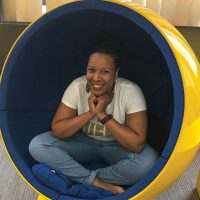
Amber C. Walker is a Madison-based writer. She unapologetically centers her work around stories from communities that are ignored by mainstream media sources. She has a particular affinity for the narratives of Black womyn and LGBTQ+ folks, which is why she was so excited to partner with Our Lives magazine to write its first QPOC Pride List. She hopes that this list will facilitate connections among QPOC folks around our state and celebrate the work we do in service to ourselves and our communities.
Walker attended Oberlin College and double majored in Africana Studies and Gender/Sexuality/Feminist Studies. Walker decided on Oberlin because of its history of providing safe spaces for people of color, womyn and LGBTQ+ folks. Oberlin provided the support she needed to articulate her identity and find community among people who shared similar experiences.
After graduating from Oberlin, Walker moved to Miami, Florida, where she served as an Americorps member and taught an after-school civic engagement program at Miami Northwestern Senior High School. After a year at “The West,” Walker was accepted into Teach for America and joined the staff at the school as an English teacher.
Walker came to Madison after accepting a job at a local healthcare IT company and quickly realized money can’t buy (enough) happiness. She decided to pursue writing full-time, and after almost a year of the freelance hustle, she accepted a job as the K-12 education reporter for the Capital Times in Madison. She is grateful that her work allows her to maintain a connection to young people and the classroom while developing her craft as a writer. When she does not have a pen in her hand or her head in a book, Walker enjoys weekend jaunts to her hometown of Chicago and live-tweeting her favorite shows. Connect: @ACWalker620 on Twitter

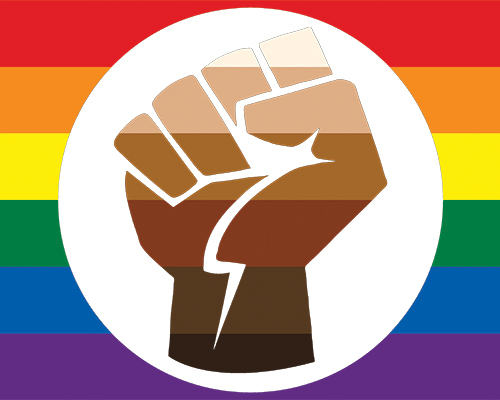






















0 Comments